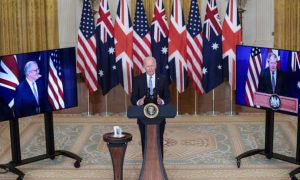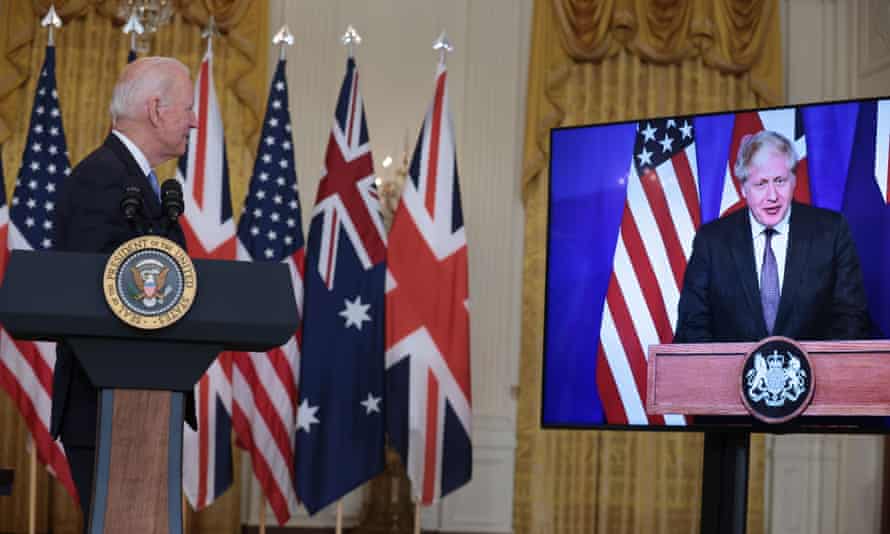Analysis: security partnership is wide-ranging and may come to define future approach to Indo-Pacific security

For those who study the history of the cold war, Washington’s new initiative with London and Canberra – known by its acronym “Aukus” – has overtones of the name UKUSA, an intelligence-sharing agreement signed 75 years ago now more commonly known as the Five Eyes partnership.
When the seven-page full text of UKUSA agreement was finally released in June 2010, Time magazine called it one of the cold war’s most important documents that “reveals one of the foundations of the special relationship the UK and the US still hold dear”.
But unlike the cold war-era UKUSA agreement, the Aukus alliance has a strong security and technology dimension. It comes at a time when many western capitals are recalibrating their relations with China. Until recent years, Australia, for example, had insisted on a “hedging” strategy in navigating changing regional dynamics. At one point, Canberra withdrew itself from the Quad, a strategic alliance with Japan, the US and India.
“This is about investing in our greatest source of strength, our alliances, and updating them to better meet the threats of today and tomorrow,” Joe Biden said late on Wednesday. “It’s about connecting America’s existing allies and partners in new ways.”
Yet, he left little doubt which power Aukus was supposed to aim at. After his nine-minute joint announcement with Scott Morrison and Boris Johnson, reporters asked: “Did you tell President Xi [Xinping] when you spoke to him last week?” and: “Is this all about China?”

“From Beijing’s perspective, this trilateral initiative is yet another US-led coalition emerging,” said Dali Yang, a Chinese foreign policy expert at the University of Chicago.
“In the last couple of years, a lot of efforts by the Chinese diplomatic community have been to trying to prevent something like this from happening,” Yang said. “Although in the meantime, Beijing has also been trying to solidify its ties with other countries, in a hope that they could remain as neutral as possible when it comes to agreements as such.”
Whether the Aukus initiative will succeed in the end still remains a question. After all, the four-year Trump presidency has shown America’s partners how multilateral initiatives can unravel overnight with a changing of the guard in Washington.
But if this initiative survives, it may show the shape of a possible future Indo-Pacific security strategy as Biden unites allies and partners to tackle “threats of the 21st century”, said Yuka Kobayashi of the School of Oriental and African Studies in London.
“At a first glance it looks like a traditional security partnership, however if you look at other areas mentioned – cyber and AI [artificial intelligence], for example, they mirror China’s Belt and Road Initiative. It covers more than security and it is about deterrence,” Kobayashi said.
Dual-track China strategy?
“With the US’s withdrawal from Afghanistan, we are seeing Washington revamping their ‘Pivot to Asia’. Similarly, the UK has pushed its identity as ‘Global Britain’, with more ambitious goals with the Indo-Pacific tilt unveiled in this year’s Integrated Review.”
Ahead of Wednesday’s announcement, senior US officials told reporters the initiative was about “sustaining and improving deterrence”. It is a narrative on China that is taking shape these days: it’s not all about confrontation, but more about deterrence as well as cooperation.
Some say that with the COP26 climate change conference just around the corner, the US and the UK in particular, would like to bring China on their side to show that a relationship that is both competitive and cooperative is viable in practice.
“But the key question is how far Biden can go with this dual-track strategy, acting more competitively in many respects, while at the same time signalling to Beijing that it still wishes to talk and collaborate on other issues,” said Neysun Mahboubi, a China expert at the University of Pennsylvania. “Will China be interested in the collaborative dimensions of this dual-track strategy at all?”
A few days before Wednesday’s announcement, Biden and Xi held their first telephone call for seven months. According to the Financial Times, the US president proposed a face-to-face meeting, but the Chinese leader did not respond.
Kobayashi thinks the muted response from Xi shows the limits of a dual-track strategy when approaching China. “Washington and its allies need to make sure they have a coherent strategy. They need to distinguish global issues such as climate change, which require global cooperation including China, and security and defence issues as covered in the Aukus alliance but also make sure they have a consistent message.”
She added: “China is the number one emitter of greenhouse gas emissions, so any meaningful response to the climate crisis requires China.”

Leave A Comment